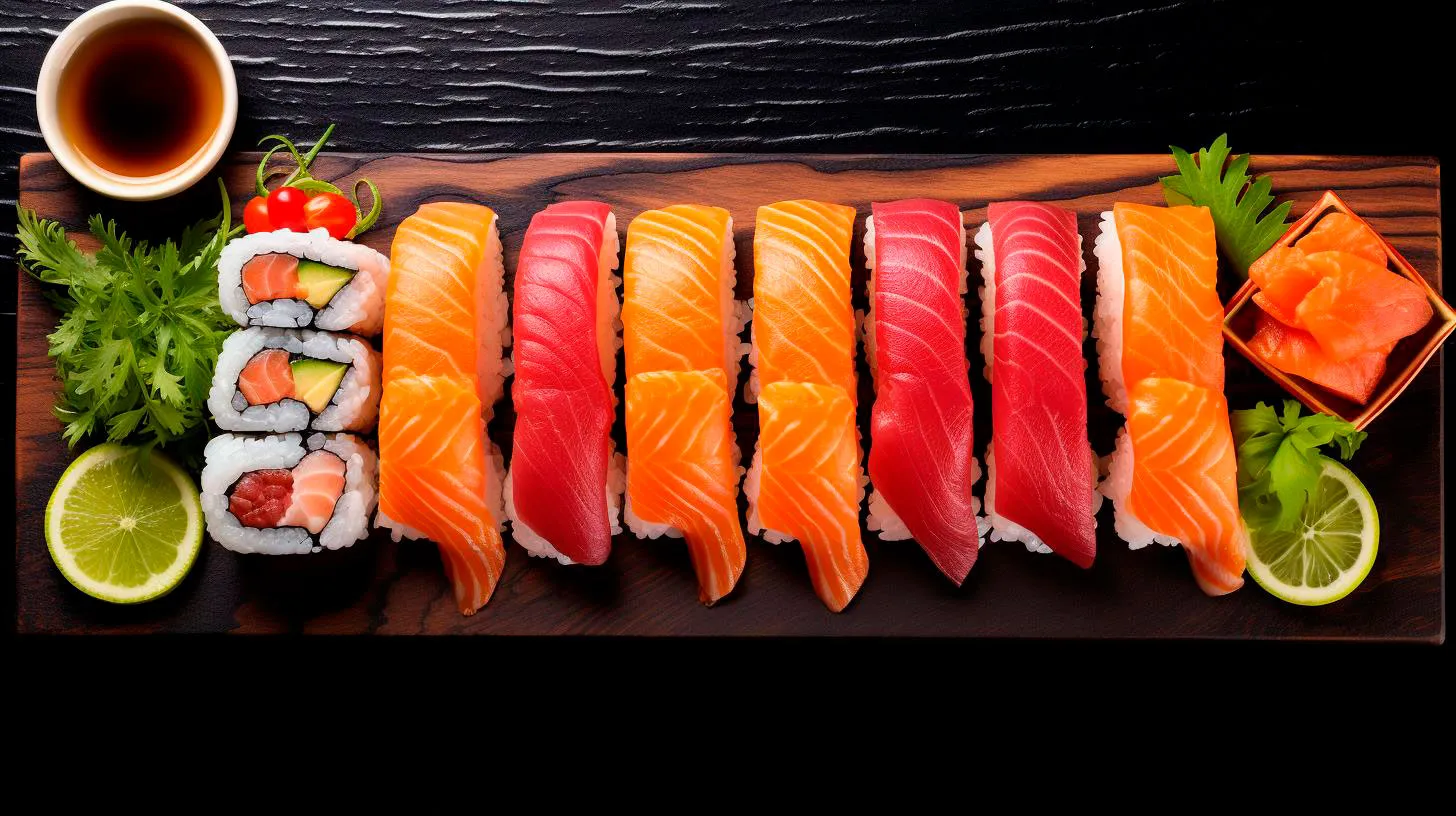Eco-Conscious Sushi Addressing Allergies while Maintaining Sustainability
Sushi, a popular Japanese delicacy, has also embraced this trend by adopting eco-friendly practices and addressing common food allergies. This article delves into how the sushi industry is striving to maintain sustainability while catering to individuals with allergies.
The Rise of Eco-Friendly Sushi
The sushi industry has embraced sustainability by implementing practices that reduce its carbon footprint. Here are some key initiatives:
- Responsibly Sourced Ingredients: Sushi restaurants are increasingly sourcing their fish and seafood from suppliers that prioritize sustainable fishing methods. This ensures that seafood populations are not depleted, helping to maintain a healthy ocean ecosystem.
- Locally Sourced Produce: Sushi restaurants are also focusing on using locally sourced produce, reducing the environmental impact caused by long-distance transportation. This also supports local farmers and promotes seasonal eating.
- Reducing Food Waste: The sushi industry is actively working towards minimizing food waste. This includes utilizing every part of the fish, recycling kitchen scraps, and implementing portion control measures to avoid excess food being thrown away.
- Compostable Packaging: Many sushi establishments have switched to using eco-friendly packaging materials such as compostable containers and utensils, reducing the amount of single-use plastic waste.
The implementation of these eco-friendly practices not only contributes to the sustainability of the sushi industry but also appeals to environmentally-conscious consumers.
Catering to Allergies
Alongside sustainability, sushi restaurants have acknowledged the importance of catering to individuals with food allergies. Here are some ways in which they address this:
- Clear Allergen Labeling: Sushi establishments are making efforts to clearly label their menu items, indicating potential allergens such as shellfish, gluten, and soy. This allows customers with food allergies to make informed choices.
- Cross-Contamination Prevention: To maintain a safe dining experience, sushi chefs are trained to avoid cross-contamination between allergen-free and allergenic ingredients. Separate utensils and preparation areas are utilized to minimize the risk of allergic reactions.
- Alternative Ingredient Options: Sushi restaurants offer alternative ingredient options to cater to customers with allergies. For instance, they may provide gluten-free soy sauce, substitute shellfish with alternatives like tofu or vegetables, or offer gluten-free rolls wrapped in cucumber or soy paper.
- Staff Education: Sushi chefs and staff undergo rigorous training to understand food allergies and their potential severity. This ensures that they are knowledgeable about allergens and can provide accurate information to customers.
By addressing food allergies, sushi restaurants create a welcoming environment for individuals with dietary restrictions, allowing them to enjoy this popular cuisine without compromising their health.
Key Takeaways
- The sushi industry has embraced sustainability by sourcing ingredients responsibly, utilizing locally sourced produce, reducing food waste, and implementing compostable packaging.
- Clear allergen labeling, cross-contamination prevention, alternative ingredient options, and staff education are vital aspects of addressing food allergies in sushi restaurants.
- By adopting eco-conscious practices and accommodating individuals with allergies, sushi establishments appeal to a wider customer base and contribute to a more sustainable food industry.
Overall, the sushi industry’s efforts to maintain sustainability while addressing food allergies showcase its commitment to meeting the evolving needs of consumers. By opting for eco-conscious sushi and supporting establishments that prioritize sustainability, individuals can enjoy a delicious meal while contributing to a greener planet.
Navigating Allergen Concerns: Eco-Friendly Alternatives for Sushi Lovers
That’s why we’re here to provide you with some handy tips and eco-friendly alternatives to enjoy your sushi experience while keeping your health and the environment in mind.
Allergen Concerns and the Sushi Menu
Sushi typically contains a combination of rice, seafood, vegetables, and seaweed. While this may seem harmless, it can pose a challenge for individuals with food allergies or intolerances. Some common allergens in sushi include fish, shellfish, gluten, soy, and sesame seeds. Individuals with these allergies need to exercise caution and take appropriate measures when ordering sushi.
Key Takeaways:
- Individuals with food allergies or intolerances need to consider potential allergens in sushi.
- Fish, shellfish, gluten, soy, and sesame seeds are common allergens found in sushi.
Eco-friendly Alternatives for Allergen Concerns
For sushi lovers who face allergen concerns, there are several eco-friendly alternatives available that offer tasty and safe options. Here are some alternatives to consider:
1. Vegetarian Sushi Rolls
Vegetarian sushi rolls are an excellent option for individuals with seafood allergies or those looking to reduce their carbon footprint. These rolls typically include ingredients such as cucumber, avocado, carrots, and tofu. They are packed with vitamins, minerals, and fiber, offering a healthy and eco-friendly choice.
Advantages:
- Safe option for individuals with seafood allergies.
- Reduces overfishing and supports sustainable agriculture.
- Packed with essential nutrients and fiber.
2. Tempura Vegetables
Tempura vegetables are another great alternative for sushi lovers with seafood allergies. These deep-fried battered vegetables, such as sweet potatoes, bell peppers, and zucchini, provide a crunchy and flavorful experience. Tempura vegetables are often served with a delicious dipping sauce, enhancing the overall taste.
Advantages:
- Offers a satisfying crispy texture.
- Provides a variety of essential nutrients.
- Expands the range of options for individuals with seafood allergies.
3. Sashimi with Allergen-Free Sauces
Sashimi, thinly sliced raw fish, can also be enjoyed by individuals with seafood allergies. By opting for sashimi with allergen-free sauces, such as gluten-free soy sauce or citrus-based dressings, you can still savor the luxurious taste of fresh fish without worrying about potential allergens.
Advantages:
- Safe option for individuals with seafood allergies.
- Provides a high-quality source of protein and beneficial omega-3 fatty acids.
- Enhanced flavor with allergen-free sauces.
Sustainable Sourcing and Environmental Impact
Choosing eco-friendly alternatives not only helps address allergen concerns but also contributes to sustainable sourcing and reduced environmental impact. By opting for vegetarian rolls, reducing seafood consumption, and supporting responsible fishing practices, we can protect marine ecosystems and promote healthier oceans.
Key Takeaways:
- Opting for vegetarian sushi rolls and tempura vegetables reduces seafood consumption and supports sustainable agriculture.
- Choosing sashimi with allergen-free sauces offers a safe option for seafood allergies.
- Supporting sustainable sourcing helps protect marine ecosystems and promotes healthier oceans.
In conclusion, sushi lovers with allergen concerns can still enjoy their favorite Japanese cuisine by considering eco-friendly alternatives. Whether it’s choosing vegetarian rolls, indulging in tempura vegetables, or enjoying sashimi with allergen-free sauces, there are plenty of options available. By making informed choices and supporting sustainable practices, we can have a delightful sushi experience while taking care of our health and the planet.
Choosing Sustainable Sushi Considering Environmental Impact and Health Safety
In this article, we will explore the importance of choosing sustainable sushi while highlighting its benefits for both the planet and our well-being.
The Environmental Impact of Sushi
With the rise in sushi consumption, sustainability has become a pressing concern. Here are some key points to consider:
- Overfishing: The demand for popular sushi fish, such as tuna and salmon, has led to overfishing, causing severe depletion of these species in the oceans.
- Habitat Destruction: Certain fishing methods, such as bottom trawling, can result in the destruction of delicate marine ecosystems like coral reefs.
- Carbon Footprint: Transportation of seafood over long distances contributes to greenhouse gas emissions, particularly if it is not sourced locally.
While these negative impacts may seem concerning, making informed choices can help mitigate them and promote sustainability in the sushi industry.
Benefits of Choosing Sustainable Sushi
Opting for sustainable sushi offers several advantages, both for the environment and our own health:
- Preserving Marine Life: By choosing sustainable fish options, we can contribute to the conservation of species, allowing fish populations to recover and maintain a healthy ecosystem.
- Supporting Local Communities: Prioritizing locally sourced sushi ingredients not only reduces carbon emissions but also supports local fishermen and their livelihoods.
- Reducing Chemical Exposure: Many unsustainable fishing practices involve the use of harmful chemicals, which can find their way into our sushi and pose risks to our health.
- Ensuring High-Quality Ingredients: Sustainable sushi often focuses on quality over quantity, ensuring fresher and more nutritious choices that benefit our well-being.
Choosing sustainable sushi isn’t just about personal preferences; it has a lasting impact on the planet and future generations to come.
Key Takeaways
When it comes to choosing sustainable sushi, keep these key takeaways in mind:
- Research Fish Sources: Look for sushi establishments that prioritize sustainable fishing practices and source their fish responsibly.
- Know Your Labels: Look for certifications such as the Marine Stewardship Council (MSC) label, indicating sustainable seafood choices.
- Explore Alternative Options: Try sushi made from sustainable ingredients like seaweed, local vegetables, or responsibly farmed fish.
- Spread Awareness: Encourage others to choose sustainable sushi and educate them about its benefits for the environment and their health.
Ultimately, our choices as consumers have the power to drive positive change in the sushi industry. By opting for sustainable sushi, we can enjoy this delectable dish while minimizing our impact on the environment and promoting a healthier future.



